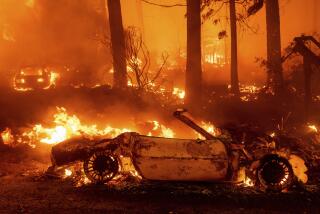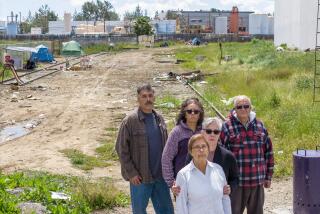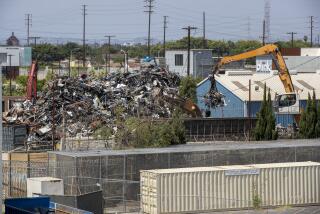Battery maker Exide Technologies files for bankruptcy protection
Battery maker Exide Technologies filed for bankruptcy protection Monday, citing the forced suspension of operations at its Vernon lead-recycling plant and other economic factors.
Exide, one of the world’s largest makers and recyclers of lead-acid batteries, said in court papers that since the plant’s April 24 closure by state regulators, the Georgia company has had to tap other sources of lead, driving up costs and cutting earnings.
“As a result of the Vernon shutdown and the company’s poor financial performance in the fourth fiscal quarter of 2013, it became apparent that a successful out-of-court restructuring was unlikely,” Chief Financial Officer Phillip Damaska wrote in a filing in U.S. Bankruptcy Court in Delaware.
Exide’s Chapter 11 petition lists assets of $1.9 billion and debts of $1.1 billion. The action, which does not affect the company’s non-U.S. operations, will allow it to restructure and reduce its debt.
It is unclear what effect, if any, the bankruptcy will have on Exide’s cleanup operations in Vernon and elsewhere. State officials said Monday that Exide must still comply with applicable laws, but environmental advocates expressed concerns that the company might use bankruptcy to duck its obligations.
Exide’s stock closed at 20 cents a share Monday, down 3.4%.
California’s Department of Toxic Substances Control halted operations at the Vernon facility this spring after The Times published articles about its arsenic emissions. The South Coast Air Quality Management District said the plant posed an elevated cancer risk to as many as 110,000 people in the area. Toxics officials also said a degraded pipeline at the plant had continually released hazardous waste into the soil.
Exide disputes the allegations and is contesting the suspension order. A hearing that began last week before an administrative law judge is to resume at an undetermined date.
The Vernon plant, which melted thousands of batteries a day, has a long history of air pollution and hazardous waste violations, including allegations that lead dust, a neurotoxin, fell onto nearby rooftops and sidewalks, according to regulators’ reports. Even so, state toxics regulators had allowed it to operate on “interim status” since the 1980s, drawing fire from community groups and environmental activists.
Liza Tucker, an advocate with Santa Monica-based Consumer Watchdog, said the $10 million the company has posted for cleanup will fall far short of what is needed.
“Not only is the DTSC falling down on protecting consumers from toxic harm,” she said in a news release. “It is also falling down on protecting them from fiscal harm.”
In a statement, the department said it “is in discussions with Exide ... to ensure corrective action investigation and cleanup are carried out.”
Times staff writer Jessica Garrison contributed to this report.







